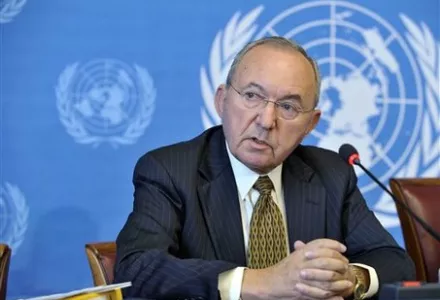On Thursday, April 26th, 2012, at 4:30 PM, the Future of Diplomacy Project at the Harvard Kennedy School's Belfer Center for Science and International Affairs will host a lecture on the role of international criminal justice in the 21st century featuring Justice Richard Goldstone, former head of the Goldstone Commission in South Africa and former chief prosecutor of the International Criminal Tribunal for the former Yugoslavia and for Rwanda. The event will take place at Weil Town Hall in the Littauer Building of the Harvard Kennedy School.
Richard J Goldstone was born on the 26th October 1938. After graduating from the University of the Witwatersrand with a BA LLB cum laude in 1962 he practised as an Advocate at the Johannesburg Bar. In 1976 he was appointed Senior Counsel and in 1980 was made Judge of the Transvaal Supreme Court. In 1989 he was appointed Judge of the Appellate Division of the Supreme Court. From July 1994 to October 2003 he was a Justice of the Constitutional Court of South Africa. Since the spring of 2004, Justice Goldstone has been teaching as a visiting professor of law at Harvard Law School, NYU Law School, Fordham Law School and Georgetown University Law Center.
Justice Goldstone is a member of the boards of Physicians for Human Rights, the Center for Economic and Social Rights and the Salzburg Global Seminar, the International Advisory Board of Mc George Law School and the Fordham University’s International Institute for Humanitarian Affairs. He is on the Advisory Board of the Coalition for the International Criminal Court. He is a Director of the American Arbitration Association. He chairs the advisory boards of the Brandeis University Center for Ethics, Justice and Public Life, the Institute for Transitional Justice and Reconciliation and the Institute for Historical Justice and Reconciliation. In April 2004, he was appointed by the Secretary-General of the United Nations to the Independent International Committee, chaired by Paul Volcker, to investigate the Iraq Oil for Food program. He is the chair emeritus of the Human Rights Institute of the International Bar Association. In 2008, he chaired a UN Committee to advise the United Nations on appropriate steps to preserve the archives and legacy of the International Criminal Tribunals for the former Yugoslavia and Rwanda. His most recent United Nations appointment is to lead a Fact Finding Mission on possible war crimes and international human rights violations committed by any party in the context of the military action in Gaza in December 2008 and January 2009.
From 1991 - 1994, he served as Chairperson of the Commission of Inquiry regarding Public Violence and Intimidation that came to be known as the Goldstone Commission. He was the Chairperson of the Standing Advisory Committee of Company Law from 1984 to 2004. From 15 August 1994 to September 1996 he served as the Chief Prosecutor of the United Nations International Criminal Tribunals for the former Yugoslavia and Rwanda. During 1998 he was the chairperson of a high level group of international experts that met in Valencia, Spain, and drafted a Declaration of Human Duties and Responsibilities for the Director General of UNESCO (the Valencia Declaration). From August 1999 until December 2001he was the chairperson of the International Independent Inquiry on Kosovo. In December 2001 he was appointed as the co-chairperson of the International Task Force on Terrorism which was established by the International Bar Association. From 1999 to 2003 he served as a member of the International Group of Advisers of the International Committee of the Red Cross. From 1985 to 2000, Justice Goldstone was National President of the National Institute of Crime Prevention and the Rehabilitation of Offenders (NICRO).
From 1995 to 2007 he was the Chancellor of the University of the Witwatersrand, Johannesburg. The many awards he has received locally and internationally include the International Human Rights Award of the American Bar Association (1994) and Honorary Doctorates of Law from universities in South Africa, Europe, North America and Israel. He is an Honorary Bencher of the Inner Temple, London, an Honorary Fellow of St Johns College, Cambridge, an Honorary Member of the Association of the Bar of New York, and a Fellow of the Weatherhead Centre for International Affairs at Harvard University. He is a Foreign Member of the American Academy of Arts and Sciences. In October 2006 he shared with Louise Arbour, the UN High Commissioner for Human Rights, the Thomas J. Dodd Prize in International Justice and Human Rights. In May, 2007 he received the Richard E. Neustadt Award from the Kennedy School of Government at Harvard University. In January 2007 he received the World Peace Through Law Award from the Whitney Harris Institute for Global Legal Studies at International Law at Washington University in St. Louis. In May 2009, he received the International Justice Award of the John D. and Catherine T. MacArthur Foundation and in December 2009, the Stockholm Award for International Justice.
He is the author of For Humanity: Reflections of a War Crimes Investigator, (2001) Yale University Press, and the co-author of International Judicial Institutions: the Architecture of International Justice at Home and Abroad (2008) Routledge.
He is married (wife Noleen) and has two married daughters - Glenda and Nicole. He has four grandsons, Jason, Sean, Ben and Jordan.

